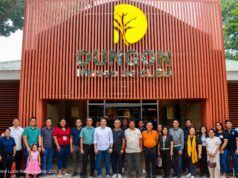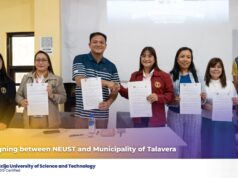During his 2nd State of the Nation Address last year, President Ferdinand R. Marcos Jr. emphasized that “digitalization is the call of today; not of the future—but of the present. It is here. It is needed, and it is needed today”.
The government must fully embrace digitalization to provide better services to the people.
Given this, the Department of Information and Communications Technology (DICT) has implemented programs and projects towards building a more inclusive and resilient digital nation.
Pilipinong Konektado: Bringing digital empowerment to Filipinos

As part of its vision for a digitally inclusive Philippines, the DICT conducted the first leg of the Bayang Digital ang Bagong Pilipinas Regional Roadshow at the National University (NU) Clark campus in Pampanga last March 14 and 15.
The roadshow aimed to encourage citizens and the government to imbibe the principles of Bagong Pilipinas and fully embrace digitalization across governance, public service, industries, commerce, and lifestyle.
DICT Secretary Ivan John Uy underscored that the agency continues to bring its services closer to the people. It strives to link Filipinos to reliable and secure connectivity and provide tools and information on the responsible use of digital data.
“Digitalization is the way in order to make our country competitive worldwide. This is the way to breach the digital divide because when you have a digital divide, you have an economic divide, a gender divide, you have a generational divide, so we need to breach that. That’s what we’re doing in all these digitization efforts,” he said.
Through the roadshow, the DICT actively engaged with the participants by listening to their concerns on how the government can become a relevant partner in their digital empowerment.
Those who participated in the roadshow were students, faculty members, women, programmers, government employees, local government officials, parents, and other stakeholders.
Offices including the Cybersecurity Bureau; Government Digital Transformation Bureau; ICT Industry Development Bureau; ICT Literacy and Competency Development Bureau; National ICT Planning, Policy and Standards Bureau; e-Government Team; Free Wi-Fi for All Project Management Team; National Broadband Program; National Government Data Center; and the National Government Portal Project also set up interactive booths for the attendees.
Attached agencies of the DICT namely the National Privacy Commission and the Cybercrime Investigation and Coordinating Center also joined the roadshow.
Gobyernong Epektibo: Transforming governance and public service digitally

DICT proudly showcased Filipino-made programs during the roadshow. Among these is the eGov PH app that allows Filipinos to access government services online through a single platform.
“With this app, you will have a government that does not sleep, it will be a 24/7 government… This is indeed transformative because through this app, instead of you having to go to the government offices to access government services, this brings government services to you right at your fingertips,” Uy pressed.
By using the app, citizens may access their various government documents or their government contributions and benefits. It allows access to government services anytime and anywhere, from beginning a transaction and up to payment completion.
The app also contains the Electronic Local Government Unit system which offers local government services such as business permit licensing, notice of violations, notification system, community tax, business tax, and real property tax. It also lets users search jobs.
The National ID system has already been integrated into the app and can be accessed by the citizens.
Kinabukasan ay Progresibo: Committing towards an ICT-enabled future

DICT taught roadshow attendees how to avoid online harms and threats. The Cybersecurity Bureau and Cybercrime Investigation and Coordinating Center in particular gave techniques on how to protect themselves from scammers or phishing attempts.
The agency also provided training opportunities through the digitaljobsPH.
“We will explore opportunities available for training and related courses through our digital jobs program for you to learn many other skills. On top of IT skills and digital programming, we will teach you digital marketing, entrepreneurship, and many others,” Uy mentioned.
DICT also provided free WiFi during the duration of the roadshow.
Given this, NU President Renato Carlos Ermita Jr. expressed the university’s willingness to collaborate with DICT. He also promised that the university will be a source of talent of learners and contributors towards the digital transformation of the country.
“We strongly believe that this is part of future-proofing the country against everything: from risks to future threats… We have to make sure that our students are exposed to what is available and ethical, as a way of protecting them,” he stated.
NU will continue to lay down the fundamentals of ethical digital practices to its students as a springboard for development in the future.
The Philippines’ quest towards digitalization will bridge the gap between the government and the people. It will set forth a nation which fully embraces digitalization under the Bagong Pilipinas. (CLJD/JLDC-PIA 3)





